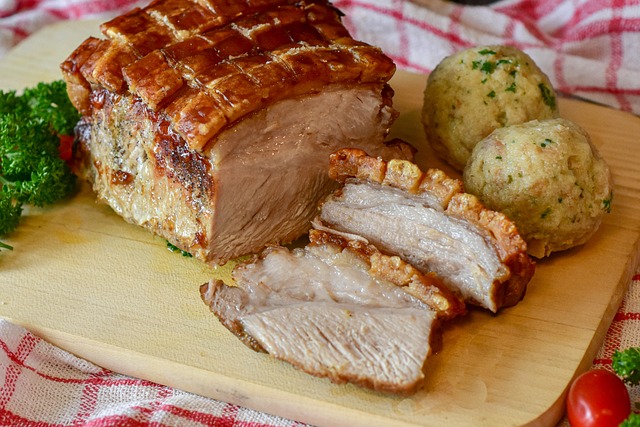In the Bible, specifically in the Old Testament, God prohibits the consumption of pork in Leviticus 11:7-8 and Deuteronomy 14:8.
Table of Contents
Religious Perspective on Consuming Pork
Have you ever wondered what God says about eating pork? For many people, dietary restrictions play a significant role in their religious beliefs. In the case of pork, there are specific guidelines outlined in various religious texts that dictate whether or not it is permissible to consume this particular meat.
In the Jewish faith, the Torah prohibits the consumption of pork. Leviticus 11:7 states, “And the pig, though it has a divided hoof, does not chew the cud; it is unclean for you.” This verse is part of the dietary laws outlined in the Torah, which serve as a guide for what is considered clean and unclean for consumption. For observant Jews, this means that pork is off-limits and should not be eaten.
Similarly, in Islam, the Quran also prohibits the consumption of pork. In Surah Al-Baqarah 2:173, it states, “He has only forbidden to you dead animals, blood, the flesh of swine, and that which has been dedicated to other than Allah.” This verse is part of the dietary restrictions outlined in Islam, which are meant to promote purity and cleanliness in one’s diet. For Muslims, avoiding pork is a fundamental aspect of their faith.
In Christianity, the perspective on eating pork is a bit different. In the New Testament, there are verses that suggest that dietary restrictions, including those regarding pork, are no longer necessary. In Acts 10:15, Peter has a vision in which he is told, “What God has made clean, do not call common.” This vision is interpreted by some Christians as a sign that the dietary laws of the Old Testament no longer apply to them.
Despite these differences in interpretation, the question of whether or not it is acceptable to eat pork ultimately comes down to individual beliefs and practices. Some people may choose to follow the dietary restrictions outlined in their religious texts, while others may interpret them differently or not adhere to them at all.
For those who do choose to abstain from eating pork for religious reasons, there are a variety of alternatives available. Many cultures have developed delicious dishes that do not include pork, making it easy to enjoy a diverse and satisfying diet without compromising one’s beliefs.
Ultimately, the decision of whether or not to eat pork is a personal one that should be made in accordance with one’s own beliefs and values. Whether you follow the dietary restrictions outlined in your religious text or choose to interpret them differently, it is important to approach the topic with an open mind and respect for the beliefs of others.
In conclusion, the question of what God says about eating pork is a complex and nuanced one that varies depending on one’s religious beliefs. While some faiths prohibit the consumption of pork, others may interpret their religious texts differently or not adhere to these restrictions at all. Regardless of where you fall on this spectrum, it is important to approach the topic with an open mind and respect for the beliefs of others.
Dietary Laws in Various Religious Texts
Have you ever wondered what different religious texts have to say about the consumption of pork? In many religions, dietary laws play a significant role in the lives of believers, guiding them on what foods are permissible and what foods are not. One such dietary restriction that is common across several religions is the prohibition against eating pork.
In the Bible, specifically in the Old Testament, the consumption of pork is forbidden for followers of Judaism. Leviticus 11:7-8 states, “And the pig, because it parts the hoof and is cloven-footed but does not chew the cud, is unclean to you. You shall not eat any of their flesh, and you shall not touch their carcasses; they are unclean to you.” This prohibition is based on the belief that pigs are unclean animals and therefore should not be consumed. Observant Jews adhere to these dietary laws and abstain from eating pork as a way to show their obedience to God.
In Islam, the consumption of pork is also prohibited. The Quran explicitly forbids the consumption of pork in several verses, including Surah Al-Baqarah 2:173, which states, “He has only forbidden to you dead animals, blood, the flesh of swine, and that which has been dedicated to other than Allah.” Muslims believe that pork is impure and should not be consumed as it goes against the teachings of Islam. This dietary restriction is taken very seriously by Muslims, and they make a conscious effort to avoid pork in their daily lives.
In Hinduism, the consumption of pork is not explicitly forbidden in religious texts. However, many Hindus choose to abstain from eating pork due to cultural and societal influences. In Hinduism, the cow is considered a sacred animal, and many Hindus follow a vegetarian diet out of respect for all living beings. While there is no direct prohibition against pork in Hinduism, many Hindus choose to avoid it as a personal choice based on their beliefs and values.
In Christianity, the prohibition against eating pork is not as strict as in Judaism or Islam. In the New Testament, Jesus declared all foods clean in Mark 7:19, which some interpret as a lifting of the dietary restrictions found in the Old Testament. While some Christian denominations may choose to abstain from eating pork for personal or health reasons, there is no universal prohibition against it in Christianity.
Overall, the prohibition against eating pork is a common theme in several religious texts, with Judaism and Islam explicitly forbidding its consumption. While Hinduism does not have a direct prohibition against pork, many Hindus choose to avoid it for cultural and societal reasons. In Christianity, the dietary restrictions found in the Old Testament are not as strictly followed, with some interpreting Jesus’ words as a lifting of these restrictions. Ultimately, the decision to eat or abstain from pork is a personal choice influenced by religious beliefs, cultural practices, and individual values.
Health Benefits and Risks of Eating Pork

Have you ever wondered what God says about eating pork? In many religious traditions, the consumption of pork is a topic of debate. Some believe that it is forbidden, while others see no issue with enjoying a juicy pork chop or crispy bacon. But what does the Bible say about eating pork?
In the Old Testament, specifically in the book of Leviticus, there are strict dietary laws outlined for the Israelites. One of these laws prohibits the consumption of pork, along with other animals considered unclean. The reasoning behind this prohibition is not explicitly stated, but many believe it was for health reasons. Pigs were known to carry diseases that could be harmful to humans if consumed.
Despite this prohibition in the Old Testament, in the New Testament, Jesus declared all foods clean. This means that Christians are no longer bound by the dietary laws of the Old Testament. In the book of Acts, Peter has a vision in which God tells him that nothing is unclean in itself. This was a significant moment in the early Christian church, as it opened the door for believers to enjoy a wider variety of foods, including pork.
From a health perspective, pork can be a nutritious and delicious addition to your diet. Pork is a good source of protein, vitamins, and minerals. It is also versatile and can be prepared in a variety of ways, from grilling to roasting to frying. However, like any meat, it is important to consume pork in moderation and choose lean cuts to avoid excess fat and calories.
On the flip side, there are some health risks associated with eating pork. Pork can be high in saturated fat, which can contribute to heart disease and other health issues if consumed in excess. Additionally, there is a risk of foodborne illnesses such as trichinosis, a parasitic infection that can be contracted from undercooked pork. To reduce these risks, it is important to cook pork thoroughly and handle it safely to prevent contamination.
Ultimately, the decision to eat pork is a personal one that may be influenced by religious beliefs, cultural traditions, and health considerations. If you choose to include pork in your diet, there are ways to enjoy it in a healthy and responsible manner. Opt for lean cuts, cook it thoroughly, and pair it with plenty of fruits and vegetables for a balanced meal.
In conclusion, while the Bible does mention the prohibition of pork in the Old Testament, in the New Testament, Jesus declared all foods clean. This has led many Christians to enjoy pork as part of their diet. From a health perspective, pork can be a nutritious and delicious option, but it is important to consume it in moderation and handle it safely to avoid health risks. Whether you choose to eat pork or not, it is essential to make informed decisions about your diet and prioritize your health and well-being.
Cultural Beliefs and Practices Regarding Pork Consumption
Have you ever wondered why some people choose not to eat pork? For many, this dietary restriction is rooted in religious beliefs. In various faith traditions, including Judaism and Islam, the consumption of pork is prohibited. But what does God say about eating pork?
In the Bible, specifically in the Old Testament, there are several references to the prohibition of consuming pork. Leviticus 11:7-8 states, “And the pig, because it parts the hoof and is cloven-footed but does not chew the cud, is unclean to you. You shall not eat any of their flesh, and you shall not touch their carcasses; they are unclean to you.” This passage is part of the dietary laws outlined in the book of Leviticus, which were given to the Israelites by God through Moses.
The reasoning behind this prohibition is not explicitly stated in the Bible, but some scholars believe that it may have been related to health concerns. In ancient times, pork was more likely to be contaminated with parasites and diseases, making it a risky choice for consumption. By abstaining from pork, the Israelites could protect themselves from potential health risks.
In Islam, the prohibition of pork consumption is also rooted in religious teachings. The Quran explicitly forbids the consumption of pork in several verses, including Surah Al-Baqarah 2:173, which states, “He has only forbidden to you dead animals, blood, the flesh of swine, and that which has been dedicated to other than Allah.” Muslims believe that these dietary restrictions are a test of their obedience to God and a way to maintain purity and cleanliness in their lives.
For those who adhere to these religious beliefs, avoiding pork is not just a matter of personal preference but a fundamental aspect of their faith. By following these dietary restrictions, they demonstrate their commitment to God and their willingness to obey His commandments.
While the prohibition of pork consumption is a common practice in Judaism and Islam, it is not a universal belief among all religious traditions. In Christianity, for example, there is no explicit prohibition against eating pork in the New Testament. In fact, in the book of Acts, Peter has a vision in which God tells him, “What God has made clean, do not call common.” This vision is often interpreted as a symbolic representation of the inclusion of Gentiles in the Christian faith, rather than a specific endorsement of pork consumption.
Ultimately, the decision to eat or avoid pork is a personal choice that is influenced by a variety of factors, including cultural beliefs, religious teachings, and individual preferences. For those who choose to abstain from pork for religious reasons, it is a way to honor their faith and demonstrate their devotion to God. And for those who do not adhere to these dietary restrictions, it is a reminder of the diversity of beliefs and practices that exist within different religious traditions.
In conclusion, the prohibition of pork consumption is a significant aspect of religious beliefs for many people around the world. Whether rooted in the teachings of the Bible or the Quran, the decision to avoid pork is a reflection of one’s commitment to God and their desire to live a life that is in accordance with their faith. So the next time you come across someone who doesn’t eat pork, remember that their dietary choice is more than just a preference – it is a reflection of their deeply held beliefs and values.
Interpreting Biblical Verses on Pork Consumption
Have you ever wondered what the Bible says about eating pork? For many people, this is a topic of great interest and debate. In the Old Testament, specifically in the book of Leviticus, there are clear guidelines about what foods are considered clean and unclean. Pork is one of the animals that is deemed unclean and forbidden to be consumed by the Israelites.
In Leviticus 11:7-8, it states, “And the pig, though it has a divided hoof, does not chew the cud; it is unclean for you. You must not eat their meat or touch their carcasses; they are unclean for you.” This passage is often cited by those who believe that eating pork is a sin and goes against God’s will. The reasoning behind this prohibition is not explicitly stated in the Bible, but many scholars believe that it was a way to protect the Israelites from diseases that could be transmitted through the consumption of pork.
However, in the New Testament, there is a shift in dietary laws. In the book of Acts, Peter has a vision in which he sees a sheet filled with all kinds of animals, including those that were previously considered unclean. A voice tells him, “Get up, Peter. Kill and eat.” Peter is hesitant at first, as he has always followed the Jewish dietary laws, but the voice insists, saying, “Do not call anything impure that God has made clean.”
This passage is often interpreted as a sign that the dietary laws of the Old Testament no longer apply to Christians. In the book of Romans, Paul also addresses this issue, stating, “One person’s faith allows them to eat anything, but another, whose faith is weak, eats only vegetables.” This suggests that what is important is not what we eat, but the faith with which we eat it.
So, what does this mean for the consumption of pork? Some Christians believe that the prohibition against eating pork was specific to the Israelites and no longer applies to modern-day believers. They argue that Jesus’ sacrifice on the cross fulfilled the law and that Christians are no longer bound by the dietary restrictions of the Old Testament.
Others, however, still adhere to the belief that eating pork is a sin. They point to passages in the New Testament where Paul warns against indulging in sinful behavior, including gluttony. They argue that consuming pork, which is often high in fat and cholesterol, can be seen as a form of gluttony and therefore goes against God’s will.
Ultimately, the question of whether or not it is acceptable to eat pork is a personal one that each individual must grapple with. Some may choose to abstain from pork out of reverence for the Old Testament laws, while others may feel free to enjoy it in moderation. What is most important is that we approach our dietary choices with a spirit of mindfulness and gratitude, recognizing that our bodies are temples of the Holy Spirit.
In conclusion, the Bible does have clear guidelines about the consumption of pork, but the interpretation of these verses can vary among Christians. Whether or not it is acceptable to eat pork ultimately comes down to personal conviction and faith. As we navigate this issue, let us do so with love and respect for one another, recognizing that we are all on a journey of faith and seeking to honor God in all that we do.
Conclusion
In the Bible, God prohibits the consumption of pork in Leviticus 11:7-8 and Deuteronomy 14:8.
For licensing reasons, we must provide the following notice: This content was created in part with the help of an AI.


